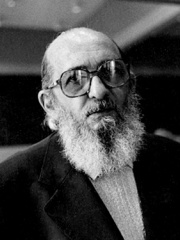
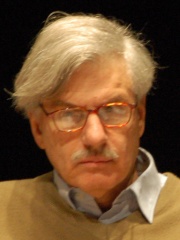
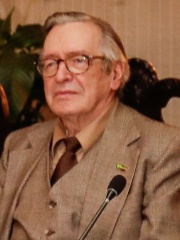
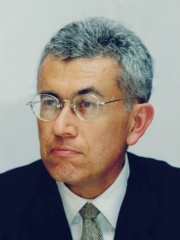
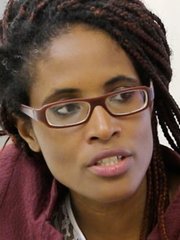
The Most Famous
PHILOSOPHERS from Brazil
This page contains a list of the greatest Brazilian Philosophers. The pantheon dataset contains 1,267 Philosophers, 6 of which were born in Brazil. This makes Brazil the birth place of the 32nd most number of Philosophers behind Sweden, and Australia.
Top 6
The following people are considered by Pantheon to be the most legendary Brazilian Philosophers of all time. This list of famous Brazilian Philosophers is sorted by HPI (Historical Popularity Index), a metric that aggregates information on a biography's online popularity.

1. Paulo Freire (1921 - 1997)
With an HPI of 73.10, Paulo Freire is the most famous Brazilian Philosopher. His biography has been translated into 46 different languages on wikipedia.
Paulo Reglus Neves Freire (19 September 1921 – 2 May 1997) was a Brazilian educator and Marxist philosopher whose work revolutionized global thought on education. He is best known for Pedagogy of the Oppressed, in which he reimagines teaching as a collaborative act of liberation rather than transmission. A founder of critical pedagogy, Freire’s influence spans literacy movements, liberation theology, postcolonial education, Marxism, and contemporary theories of social justice and learning. He is widely regarded as one of the most important educational theorists of the twentieth century, alongside figures such as John Dewey and Maria Montessori, and considered "the Grandfather of Critical Theory".

2. Michael Löwy (b. 1938)
With an HPI of 59.81, Michael Löwy is the 2nd most famous Brazilian Philosopher. His biography has been translated into 16 different languages.
Michael Löwy (born 6 May 1938) is a French-Brazilian Marxist sociologist and philosopher. He is emeritus research director in social sciences at the CNRS (French National Center of Scientific Research) and lectures at the École des hautes études en sciences sociales (EHESS; Paris, France). Author of books on Karl Marx, Che Guevara, Liberation Theology, György Lukács, Walter Benjamin, José Carlos Mariátegui, Lucien Goldmann and Franz Kafka, he received the CNRS Silver Medal in 1994.

3. Olavo de Carvalho (1947 - 2022)
With an HPI of 59.26, Olavo de Carvalho is the 3rd most famous Brazilian Philosopher. His biography has been translated into 29 different languages.
Olavo Luiz Pimentel de Carvalho (Brazilian Portuguese: [oˈlavu luˈis pimẽˈtɛw dʒi kaʁˈvaʎu]; 29 April 1947 – 24 January 2022) was a Brazilian self-proclaimed philosopher, political pundit, astrologer, journalist, and far-right conspiracy theorist. While publishing about politics, literature and philosophy since the 1980s, he made himself known to wider Brazilian audiences from the 1990s onwards, mainly writing columns for some of Brazil's major media outlets, such as the newspaper O Globo. In the 2000s, he began to use personal blogs and social media to convey his conservative and anti-communist ideas. In the late 2010s, he rose to prominence in the Brazilian public debate, being dubbed the "intellectual father of the new right" and the ideologue of Jair Bolsonaro, a label which he rejected. His books and articles spread conspiracy theories and false information, and he was accused of fomenting hate speech and anti-intellectualism. He positioned himself as a critic of modernity. His interests included historical philosophy, the history of revolutionary movements, the Traditionalist School and comparative religion. His views were rejected by mainstream philosophers. From 2005 until his death, he lived near Richmond, Virginia, in the United States. He died in 2022 several days after reportedly testing positive for COVID-19.

4. Roberto Mangabeira Unger (b. 1947)
With an HPI of 55.33, Roberto Mangabeira Unger is the 4th most famous Brazilian Philosopher. His biography has been translated into 15 different languages.
Roberto Mangabeira Unger (; Brazilian Portuguese: [ˈũɡɛʁ]) is a Brazilian philosopher and politician. His work is in the tradition of Western philosophy and classical social theory, and is developed across fields in legal theory, philosophy and religion, social and political theory, progressive alternatives, and economics. In natural philosophy he is known for The Singular Universe and the Reality of Time. In social theory he is known for Politics: A Work in Constructive Social Theory. In legal theory he was associated with the Critical Legal Studies movement, which helped disrupt the methodological consensus in American law schools. His political activity helped the transition to democracy in Brazil in the aftermath of the military regime, and culminated with his appointment as Brazil's Minister of Strategic Affairs in 2007 and again in 2015. His work is seen to offer a vision of humanity and a program to empower individuals and change institutions. At the core of his philosophy is a view of humanity as greater than the contexts in which it is placed. He sees each individual possessed with the capability to rise to a greater life. At the root of his social thought is the conviction that the social world is made and imagined. His work begins from the premise that no natural or necessary social, political, or economic arrangements underlie individual or social activity. Property rights, liberal democracy, wage labor—for Unger, these are all historical artifacts that have no necessary relation to the goals of free and prosperous human activity. For Unger, the market, the state, and human social organization should not be set in predetermined institutional arrangements, but need to be left open to experimentation and revision according to what works for the project of individual and collective empowerment. Doing so, he holds, will enable human liberation. Unger has long been active in Brazilian opposition politics. He was one of the founding members of the Brazilian Democratic Movement Party and drafted its manifesto. He directed the presidential campaigns of Leonel Brizola and Ciro Gomes, ran for the Chamber of Deputies, and twice launched exploratory bids for the Brazilian presidency. He served as the Minister of Strategic Affairs in the second Luiz Inácio Lula da Silva administration and in the second Dilma administration.
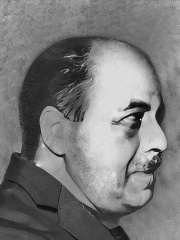
5. Vicente Ferreira da Silva (1916 - 1963)
With an HPI of 52.64, Vicente Ferreira da Silva is the 5th most famous Brazilian Philosopher. His biography has been translated into 21 different languages.
Vicente Ferreira da Silva (10 January 1916 – 19 July 1963) was a Brazilian logician, mathematician, and philosopher. He was among the first in Brazil to write and publish academic books on Logic and Phenomenology, with a special interest in Heidegger.

6. Djamila Ribeiro (b. 1980)
With an HPI of 39.30, Djamila Ribeiro is the 6th most famous Brazilian Philosopher. Her biography has been translated into 14 different languages.
People
Pantheon has 6 people classified as Brazilian philosophers born between 1916 and 1980. Of these 6, 2 (33.33%) of them are still alive today. The most famous living Brazilian philosophers include Michael Löwy, and Roberto Mangabeira Unger. The most famous deceased Brazilian philosophers include Paulo Freire, Olavo de Carvalho, and Vicente Ferreira da Silva. As of April 2024, 1 new Brazilian philosophers have been added to Pantheon including Djamila Ribeiro.
Living Brazilian Philosophers
Go to all RankingsDeceased Brazilian Philosophers
Go to all RankingsPaulo Freire
1921 - 1997
HPI: 73.10
Olavo de Carvalho
1947 - 2022
HPI: 59.26
Vicente Ferreira da Silva
1916 - 1963
HPI: 52.64
Djamila Ribeiro
1980 - Present
HPI: 39.30
Newly Added Brazilian Philosophers (2025)
Go to all RankingsOverlapping Lives
Which Philosophers were alive at the same time? This visualization shows the lifespans of the 3 most globally memorable Philosophers since 1700.

